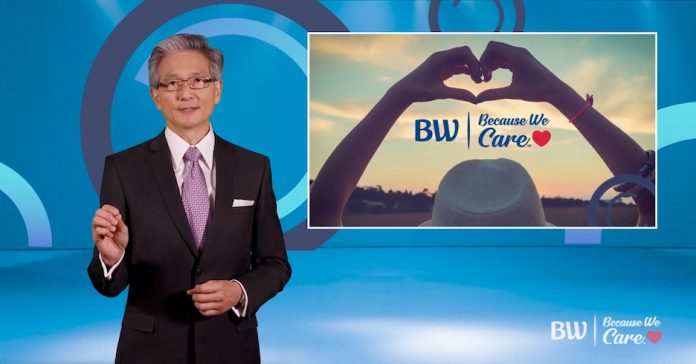
Last week, Best Western virtually hosted its 2020 Convention. Over the course of three days, top Best Western leadership delivered insights into how the company has been handling the ongoing COVID-19 pandemic, including the support it has offered Best Western members throughout the last eight months. The convention also served as the backdrop for a number of panels and discussions featuring hotel industry experts.
Responding to the Pandemic
Best Western chairman Peter Kwong kicked off the event. “While most of us would agree that 2020 is the toughest year we’ve faced together, it has demonstrated the strength of our brand and members,” he said in his remarks, noting that the theme of this year’s conference was “Because we care.” “It’s because we care, we will continue to find ways to help and support our members during this very difficult time,” he noted.
David Kong, Best Western president and CEO, also addressed attendees, focusing on how Best Western has helped members survive during these difficult times. “This pandemic has been incredibly challenging for all of us. It has upended our way of life. From the onset, our goal was to share the pain and help our members survive,” he said. “I’m proud of the relief that we’ve provided to our members… We’ve reduced fees in multiple ways and suspended brand requirements.”
Kong noted that Best Western estimated that member relief efforts would cost the company $30 million, and as a result, they implemented an “unprecedented austerity plan” that included company-wide pay reductions and streamlining corporate staff. “These decisions were painful and regrettable, but were needed to ensure the ongoing viability of our company,” Kong said.
A Piece of the Pie
In his opening address, Kong mentioned that Best Western’s RevPAR index “continues to be strong” and added that the Best Western brand is performing well during pandemic times. “Our brand is much stronger now, and we have more favorable traction with travelers and clients than ever before,” he explained.
Kong added that the company’s focus now is on attracting what business is out there to Best Western properties, specifically mentioning traveling nurses, sports teams, construction workers.
On the second day of the conference, Dorothy Dowling, Best Western’s CMO, also spoke about what the company is doing to attract business during these lean times. “Throughout COVID, the focus of our worldwide sales team has been on the companies that have continued to travel and winning our share of this business. In other words, we’re focused on the right accounts at the right time to secure the most business,” she described.
“Since the onset of the pandemic, we’ve seen an increased demand for project-, disaster-, and quarantine-related business. We are using various datapoints from our customer base and major third parties to hone our strategies and identify the companies traveling today, capturing those bookings and ultimately shifting market share,” she added.
Dowling also described that engaging with guests and being able to quickly respond to their needs was key to Best Western’s approach to doing business in the COVID era. “We’re engaging with customers in ways they want to engage, which means listening to their voice and delivering the solutions they are seeking. We know our hotels have had to think differently as well. We applaud you for being so quick to respond to business opportunities that have a short turnaround,” she said.
Expert Insights
Glenn Hausmann, industry expert, host of The No Vacancy Podcast, and conference emcee, also moderated several panels comprising industry experts. One panel spotlighted Chip Rogers, CEO of AHLA, Cecil Staton, CEO of AAHOA, and Roger Dow, CEO of the U.S. Travel Association. Another dove into the numbers with Amanda Hite, president of STR, Jamie Lane, senior director of economics and forecasting at CBRE, and Adam Sacks, president of Tourism Economics/Oxford Economics. Another discussion took place among the Best Western Board of Directors.
On that latter panel, the conversation turned toward how Best Western hoteliers could best prepare for the future. Terry Bichsel, director, District II, noted that owners should not fight the major changes that COVID has forced on the industry. “You have to let it evolve, first of all, and look for signs of improvement and be ready when those signs of improvement show their faces,” he said. “We have to remain proactive at all times.”
He concluded, “We can’t lay down like we’re dead. We’ve got to be ahead of this thing and we’ve got to be ready to react, and we’re going to have to take more risks.”











